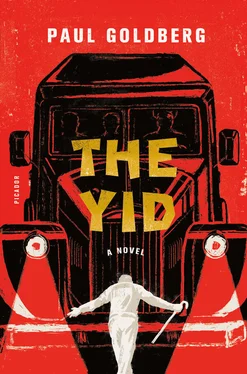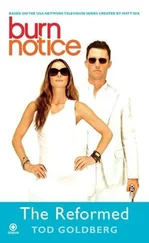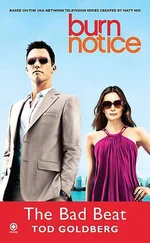Make them look up to you, Mr. Lewis. It’s important. Your friend, Charles.
Soon after that, Charles Bunyan vanished without a trace. The Party and the organs of state security were purging the country of bourgeois specialists and internal wreckers. Even foreigners — especially pale-skinned foreigners — were no longer guaranteed safety.
There was no report of Bunyan’s departure via Black Maria. Even his company Ford remained in place in his driveway. The mystery of his disappearance remains unsolved.
* * *
In 1941, after the Nazis invaded, Lewis volunteered to join the army, but he was sent east instead. The blast furnaces he had helped construct were working around the clock, producing steel for the war.
Tatyana went with him, completed a nursing course, and was sent to the front. She perished with the Second Shock Army, killed in the swamps of Vereya in June of 1942, a casualty of a criminally botched attempt to break through to the besieged Leningrad.
On the morning of February 25, 1953, more than at any other time over the decade that has elapsed since he and Tatyana parted at a railroad station, Lewis longs for her. Is she leading him on another adventure beyond his horizon? Was it not Tatyana’s mad uncle who had handed Lewis the sword with which he spilled the blood of a man who called him Paul Robeson?
Outside, Lewis hears the sound of clanging sticks. Levinson and Kogan are once again conducting war games.
That morning, Kogan doesn’t fight like a goat. He is Levinson’s equal. The two spar verbally as well.
“You, Kogan, fight like a goy .”
“A goy ? Explain, My Lord, how fights a goy ?”
“A goy, briderlakh, aims for the chest.”
“Where should I aim?”
“A Yid has but one place to aim: the throat. Be true to what your audience expects.”
“Why do what they expect? Why not surprise them?”
“I answer with a question: Why do we kill?”
“We kill to teach.”
“How will the audience learn, unless they get the realization of their biggest fear? What do they fear, Kogan?”
“They fear ritual murder. Is this what you suggest?”
“I suggest nothing but what they fear. They write the play: a ritual murder. Or maybe just ritualistic.”
“And a conspiracy?”
“They fear it, which means they’ve earned it.”
Lewis steps up to the ring.
“Last night I killed a man.”
Levinson and Kogan interrupt their match of swordsmanship.
“How do you feel?” asks Kogan.
“Much better than I’d like.”
“I understand. The first time I killed was in 1918, the day I met der komandir .”
“That was war,” says Levinson.
“War is relative. I hate killing, but I don’t hate myself for having killed.”
“You haven’t asked me who he was,” says Lewis.
“I didn’t think I had to,” Kogan replies.
“He was a night guard.”
“Butusov, then,” says Kogan. “May he rest in peace.”
“You haven’t asked me why I did it. And how.”
“I didn’t need to ask,” says Kogan. “He saw you get out of the Black Maria, and then he saw your face.”
“It was a case of him or me.”
“And then you killed him with my sword, and let him drop onto the tracks,” says Levinson.
“I did. Tell me about him, Kogan.”
“No sense in it. He was an anti-Semite, but a good man.”
“Do such things happen?”
“Often,” says Kogan. “He hated us in the abstract. He hated the idea of our being. But one-on-one, he was a decent man. I’ve fought beside men like him, and I would again.
“I would have trusted him with my life.”
* * *
“The old Bundist couldn’t stay away,” says Levinson as a short, muscular man with a prominent chin walks through the gate of the dacha.
“How much does he know?”
“He cleaned up my room. He knows.”
Levinson first introduced Kogan and Moisey Semyonovich before the war, at a performance of Kinig Lir . The two renewed their acquaintance near Stalingrad. Though they spoke Yiddish whenever they were out of the earshot of others, they eschewed the informality of Yiddish culture, addressing each other as Doktor and Khaver . Moisey Semyonovich was technically a major; Dr. Kogan, a colonel.
After the war, Doktor Kogan and Khaver Rabinovich developed a separate, professional relationship. Whenever Moisey Semyonovich needed to refer a patient to Pervaya Gradskaya, he called Kogan, and whenever Kogan needed to obtain medication for an acquaintance, he called Moisey Semyonovich, who took out his own scales and measured out the required substances.
LEVINSON: To what do we owe the honor?
MOISEY SEMYONOVICH: You needed me, and I came.
LEVINSON: We whispered into the wind and you heard?
KOGAN (extending his hand) : Nonsense, Khaver Rabinovich. I invite you now.
MOISEY SEMYONOVICH: Thank you, doctor.
LEVINSON: Lewis, Moisey Semyonovich has a function in God’s creation. He illustrates a principle: an old conspirator invariably thinks he smells the revolution — even when something completely different is in the air. Just think revolution, just whisper the word into the wind, and next thing you are staring at an old Marxist like this one, smelling of mothballs and thinking bloody thoughts. Just whisper ever so softly, and they will come, lone wolves, wizened sparrows.
KOGAN: I thought it was the other way around. First, you have the revolutionaries, and, second, they make the revolution.
LEVINSON: Reading Lenin? Stop! He was then. We are now.
MOISEY SEMYONOVICH: Genig, khaverim. Enough. They can occupy themselves like this all day.
LEWIS: And if you let them, revolution is kaput.
LEVINSON: Let’s get our terminology straight, Lewis. There is no revolution. We will do what history calls for.
LEWIS: And it’s calling for a single, isolated act of terror?
LEVINSON: Lenin was wrong. It’s a mistake to negate the individual’s role in history. Class isn’t everything. Revolution isn’t always the answer. There are times when simple terrorism is good enough.
A yearning for solitude descends on Lewis suddenly.
What is he doing in this cold, impoverished, barbaric land? The Moor of the World Revolution, a Yiddish-speaking Moor who killed one man and dumped three dead ones in a well.
The newly acquired status of murderer hasn’t begun to bother Lewis, and the only remorse he squeezes out of his soul that day is the remorse for feeling no remorse. While logic is commanding him to sense eternal doom, he stubbornly continues to feel hopeful, energized, free.
Are Levinson and Kogan serious about their plot to assassinate Stalin, or is this a theater game staged by infantile old men? Has Lewis really joined the plot, or the farce, or whatever it is?
Levinson and Kogan are real-life Red partisans, real guerrillas from the Civil War, yet they are nothing like the characters from Soviet war epics or the heroes Lewis imagined at the outset of his obsession with Russian Communism.
These men are profoundly disorienting. Did they fight wars in this ambiguous state of mind, between pursuit of victory and utter nonsense? How can they switch so easily from killing to absurdism, from swordplay to wordplay? With all that smoke, do they have the capacity to understand each other?
Has Lewis agreed to follow these clowns in a horrific, heroic, hilarious dive off the trapeze? He has just killed a man. Was this in self-defense, for a cause, or for a gag?
Humor plays no role in Lewis’s life. Certainly, he can never acquire the ability to treat death — especially death he caused — as a lighthearted matter.
Читать дальше












